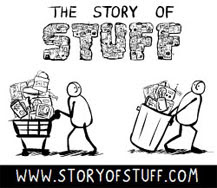On the surface this seems like a sad state of affairs, and in some ways it is. We have felt the crunch here too. We've had to limit our visits to Grandma to just once a month because we can't afford the gas to get there more often than that. We've also cancelled our vacation for this summer due to the $4 gas that is being predicted for the season (the first time we have ever skipped a family vacation). But on further reflection is this really that bad of a thing? For example, the article states:
"Christine Hadley, a 53-year-old registered nurse from Reading, Pa., says she used to be "a clotheshorse," splurging on pricey Dooney & Bourke handbags. But her live-in boyfriend left last year, and she has had trouble finding a job. Piles of unpaid bills forced her to sell more than 80 items, including the handbags, which went for more than $1,000 on a site called AuctionPal.com. Now, except for some artwork and threadbare furniture, her house is looking sparse."
This poor woman had to sell $1000 worth of purses! How sacrificial. The article also gives examples of people who had to sell DVD players and TVs and even *gasp* their artwork. When handbags, art, and electronics become our prized belongings we are in a sorry state. People are realizing for the first time that food and shelter might be more important than Hermes jackets and Versace jeans (another example of items on the auction block).
I think this may be a valuable wake up call for our country. If this kind of economic depression is what it takes to make people re-evaluate their priorities than it really isn't a bad thing. If we can acknowledge our dependence on "things" and give them up in order to focus on what really matters (God, family, and service to others) then we are moving in the right direction.



 You remember him, don't you? I think you two last met back in September sometime.
You remember him, don't you? I think you two last met back in September sometime. Have a nice day!
Have a nice day!






























